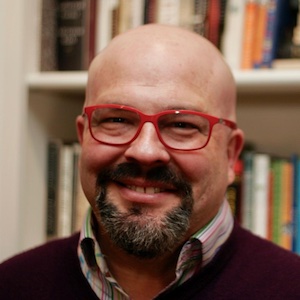By Eliza Browning
In November 2022, ΦBK Visiting Scholar Ricardo Padrón, a professor of Spanish at the University of Virginia, gave two talks at the University of Connecticut exploring his wide-ranging research interests in the literature and culture of the early modern Hispanic world. The first focused on Spain’s colonization of the Philippines and encounter with Ming China, a little-known historical episode that raised questions about China’s role on the global stage as visualized from a European perspective. In this case, Padrón argued that it was the “nature of the Chinese government, not religion, that proved to be crucial.” A subsequent lecture examined Padrón’s research for his recent book The Indies of the Setting Sun: How Early Modern Spain Mapped the Far East as the Transpacific West (University of Chicago Press, 2020), which focuses on the place of the Pacific and Asia in the Spanish concept of “the Indies.” Padrón’s research took him around the world to China, Japan, and the Philippines, and was sponsored by UVA’s Center for Global Inquiry and Innovation as well as the National Endowment for the Humanities.
Padrón’s interdisciplinary research encompasses empire, literature, cartography, and the geopolitical imagination, and has the potential to illuminate new questions about the nature of the early modern Hispanic world. His 2004 book, The Spacious Word: Cartography, Literature and Empire in Early Modern Spain, emerged as a seminal work of early modern Hispanic cartography that reconsiders the relationship between early Spanish concepts of the world and the origins of European colonialism. The Indies of the Setting Sun challenges established narratives of “the invention of America” by examining the ways 16th-century Spaniards imagined the New World and Asia as connected spaces. His research has been supported by the American Council of Learned Societies and the National Endowment for the Humanities, and he currently serves on the Board of Directors of the Renaissance Society of America. After spending the spring of 2022 on research leave as a visiting professor at the École des Hautes Études en Sciences Sociales in Paris, Padrón was nominated as a ΦBK Visiting Scholar for the 2022-2023 academic year.
Since 1956, the ΦBK Visiting Scholar Program has contributed to campus intellectual life by facilitating an exchange of ideas between Visiting Scholars and the faculty and students of various affiliated campuses. The 13 2022-2023 ΦBK Visiting Scholars travel to more than 100 colleges and universities, spending two days on each campus and contributing to academic life. Scholars meet with students and faculty members, participate in classes and seminars, occasionally host specialized workshops and events, and give a public lecture open to both the campus community and the general public. Padrón’s visit to UConn was one of eight or nine institutions he will lecture at this academic year, including Southwestern University, the University of Iowa, and Grinnell College.
Hadley Kelly, the director of the ΦBK Visiting Scholar Program, identified Padrón’s wide-ranging research as key to his outreach as a ΦBK Visiting Scholar. Although ΦBK Visiting Scholars are chosen to represent a diverse variety of disciplines and fields, many have interdisciplinary interests that can engage a wider academic and public audience. Padrón’s interest in cartography, said Kelly, is one of these unique “topics and connections” that can attract a diverse audience outside of his overlapping disciplines, who then might be inspired to explore a new avenue of interest or incorporate some of Padrón’s research into their own work. The ΦBK Visiting Scholar lectures, which are open to the public as well as students, are therefore a powerful tool of expanding the Society’s reach and breaking down disciplinary boundaries. “It’s an opportunity to get word out about Phi Beta Kappa,” Kelly added, explaining that many students first encounter ΦBK through the lecture series and are inspired to explore how to become involved in the organization. Additionally, many scholars participate in research or career workshops that enable students to learn from an expert in their field and expose them to new potential paths to graduate school or careers. By providing the opportunity for students and the public alike to explore new areas of academic interest, the ΦBK Visiting Scholars Program connects university members to a broader academic culture that bridges the divide between disciplines, institutions, and campus chapters.
Eliza Browning is a master’s student at the University of Oxford studying modern and contemporary literature. She graduated Phi Beta Kappa in May 2022 from Wheaton College, where she was inducted in November 2021. Wheaton College is home to the Kappa of Massachusetts chapter of Phi Beta Kappa.




